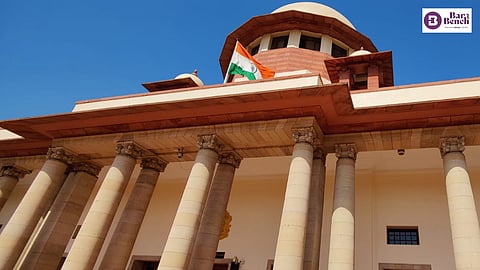
- Latest Legal News
- News
- Dealstreet
- Viewpoint
- Columns
- Interviews
- Law School
- Legal Jobs
- हिंदी
- ಕನ್ನಡ

The Supreme Court recently reiterated in view of Section 313 of the Code of Criminal Procedure (CrPC), it is the duty of courts to consider the defence presented by an accused and give reasons in writing while adjudicating on the same [Jai Prakash Tiwari vs State of Madhya Pradesh].
A bench of Chief Justice of India NV Ramana, and Justices Krishna Murari and Hima Kohli stated that such defence must be scrutinised by application of mind and not handled cursorily.
The Court explained that Section 313 CrPC envisions a reasonable opportunity to be given to accused where all adverse evidence is presented in the form of questions for them to articulate their defence.
"If all the circumstances are bundled together and a single opportunity is provided to the accused to explain himself, he may not able to put forth a rational and intelligible explanation. Such, exercises which defeats fair opportunity are nothing but empty formality. Non-fulfilment of the true spirit of Section 313 may ultimately cause grave prejudice to the accused and the Court may not have the benefit of all the necessary facts and circumstances to arrive at a fair conclusion," the Court said.
The Supreme Court was hearing an appeal by a person convicted for attempt to murder based largely on the witness statements of the complainant and her mother.
The alleged offence took place in 2003, the trial court had convicted the appellant in 2005 and the Madhya Pradesh High Court upheld the same in 2017.
The appellant upheld the same in 2018. He underwent about 1 year and 7 months of his sentence before he was released on interim bail by the top court.
While noting that the counsel for the accused-appellant had not submitted that there was prejudice caused due to individual questions not being asked at the trial, the top court decided to proceed with the matter on its merit.
It did so given the duration of the litigation.
At the outset, the Bench noted that it was trite that even related witness statements need to be scrutinized carefully. The eye-witness statement of the mother did not inspire confidence and there was no cartridges found at the alleged site of the offence, the Court noted.
Further, the appellant-accused had already been acquitted in another criminal case filed by the complainant, the Court noted.
"In the present case, the courts below failed to scrutinize the defence version put forward by the appellant-accused in his Section 313 statement. The object of Section 313 of the Code is to establish a direct dialogue between the court and the accused," the apex court said.
The purpose of Section 313 CrPC is to provide the accused a reasonable opportunity to explain the adverse circumstances which have emerged against him during the course of trial, the bench underlined.
"A reasonable opportunity entails putting all the adverse evidences in the form of questions so as to give an opportunity to the accused to articulate his defence and give his explanation," the judgment stated.
Further, where an accused sets up a defence or offers an explanation, it is well settled that he is not required to prove his defence beyond a reasonable doubt but only by preponderance of probabilities, the Court added.
The top court, therefore, allowed the appeal and acquitted the accused, who was already out on bail, and discharged his bail bonds.
"It is the duty of the Court to separate the grain from the chaff and to extract the truth from the mass of evidence", the Bench stated before parting with the judgment.
Advocates Vikas Upadhyay and Kaustubh A appeared for the appellant.
Advocates Pashupathi Nath Razdan, Mirza Kayesh Begg, Prakhar Srivastav, Astik Gupta, Ayushi Mittal, and Pulkit Aggarwal appeared for the respondent-State.
[Read Judgment]